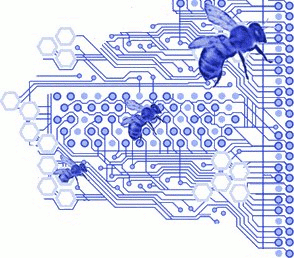Workshop
on The
Emergence of Social
Behaviour:
From
Cooperation to Language

This workshop took place on 10.09.07. The website will be maintained as an archive and to post announcements related to the workshop.
The emergence of social groups has been identified as a major transition in the evolution of complex life [1]. However, the conditions that allowed individuals to overcome conflict and establish different types of stable social behaviours is still a major unresolved question.
Different types of social behaviour, such as altruism, cooperation and communication in social bacteria, social insects, and vertebrates, as well as language in human societies, show the huge range of complexity and the integrated role of social behaviour in the formation of complex life. Most research focuses on one particular type of sociality within this range; however, it remains unclear how different levels of social complexity are achieved, how they follow from one another and how a gradual complexification in sociality occurs.
Current work addresses the emergence of social behaviour using different approaches, from analytical and game theoretical models, minimalist and complex agent-based simulations to robot language games and experiments in simple social organisms.
The focus of the workshop is threefold: (1) understanding the minimum requirements for the emergence of each type of sociality and the transitions between these various degrees of complexity from non-sociality to sociality; (2) finding common mechanisms in the emergence of different types of social behaviour observed in natural systems, how they relate to each other and how they are influenced by environmental conditions and other evolutionary parameters; (3) finding the strengths and limitations of the various scientific approaches taken in addressing these questions and integrating them into a common framework for research on social behaviour.
Also see the parallel workshop on social learning in embodied agents.
References
[1] Maynard-Smith, J. and
Szathmàry, E. (1997). The Major Transitions in Evolution
(New York:
Oxford University Press).
[2] Wilson, E. O. (1975). Sociobiology: the New Synthesis (The Belknap
Press of Harvard University).
Call for Papers: Special Issue, Journal of Biological Theory
We would hereby like to invite you to submit a paper to be published in the summer of 2008 in the journal of Biological Theory (MIT Press) in a special issue entitled “The Emergence of Social Behaviour”.
We welcome contributions from research areas that address one or more of the following topics:
- Types of social behaviour
- Coordination, Cooperation, Conflict and Altruism
- Communication and Language
- Factors influencing the emergence of social behaviour
- Interaction topologies (mean field, small world, etc.): Limited dispersal, range of competition, levels of selection
- Social hierarchies and social queues
- Sexual vs. asexual reproduction, monogamy vs. polygamy, reproductive skew models
- Individual and kin recognition
- Reputation and tags
Submitted papers should be between 6 and 14 pages in length, and should be formatted according to the Biological Theory style guidelines. Submissions should be sent in pdf format to sara.mitri@epfl.ch by 04.01.08.
All submitted papers will undergo a peer-review process. Accepted
papers will be published in a special issue on the emergence of social
behaviour in the journal of Biological
Theory (MIT Press).
| 8:50 | Opening |
| 9:00 | Invited speaker: Rui F. Oliveira "Social behaviour in context: How animals adjust their behaviour to the social environment" |
| 10:00 | Steffen Wischmann, Frank Pasemann and Florentin Wörgötter: "Cooperation and competition: Neural mechanisms of evolved communication systems" |
| 10:30 | Coffee break |
| 11:00 | Invited speaker: Eörs Szathmàry "The origin of language" |
| 12:00 | Discussion |
| 12:30 | Lunch break |
| 14:00 | Anne Kandler and James Steele: "Diffusion-reaction systems for language competition" |
| 14:30 | Amac Herdagdelen and Haluk Bingol: "A cultural market model" |
| 15:00 | Nicholas Geard and Seth Bullock: "Milieu and function: Toward a framework for understanding multimodal networks" |
| 15:30 | Coffee break |
| 16:00 | Invited speaker: Andy Gardner "Capturing the super-organism" |
| 17:00 | Discussion |
| 17:30 | End of workshop |
- Jason Noble
- Rick Riolo
- Chris Knight
- Simon Kirby
- Andy Gardner
- Christoph Hauert
- Dario Floreano
- Laurent Keller
- Eörs Szathmàry
- Eörs Szathmàry: "The origin of language" (confirmed)
It seems that complex theory of mind, teaching, complex cooperation and language together form an adaptive suit in the human race. It is plausible that genes changed in evolution so as to render the human brain more proficient in linguistic processing. An Evolutionary Neurogenetic Algorithm (ENGA) is also reviewed that holds promise that we shall ultimately understand how genes can rig the development of cognitively specialised neuronal networks.
- Andy Gardner: "Capturing the super-organism" (confirmed)
- Rui F. Oliveira: "Social behaviour in context: how animals adjust their behaviour to the social environment" (confirmed)
Animals interact with each other frequently and these interactions modulate subsequent interactions among them and with other group members. Thus, animals must fine-tune the expression of their social behaviour to the social environment in which they live. Classically associative learning rules have been proposed to explain these effects of prior experience on the expression of social behaviour, whereas variations in the internal state (motivation) of the animal have not been taken into account. We propose that hormones (in particular androgens) may play a major role as physiological mediators of the modulation of social behaviour by social context; two types of evidence support this hypothesis: (1) social interactions elicit rapid responses in circulating levels of androgens; (2) androgens are known to have activational effects on the expression of social behaviour. We will present data demonstrating an involvement of androgens in the mediation of the following experiential (social) effects: anticipatory effect; bystander priming effect in bystanders; winner/loser effect (i.e. winner keep winning and loser keep losing); “dear enemy” (familiarity) effect. The possible mechanism involved in the translation of social information into an endocrine response will also be discussed. Together these results suggest an interrelationship between hormonal factors, that regulate the internal state of the animal, and associative learning mechanisms in the regulation of social behaviour.
Ecole
Polytechnique Fédérale de Lausanne
EPFL-STI-I2S-LIS
Station 11
CH-1015 Lausanne, Switzerland
Webpage:
http://lis.epfl.ch
E-mail: {firstname}.{lastname}@epfl.ch



